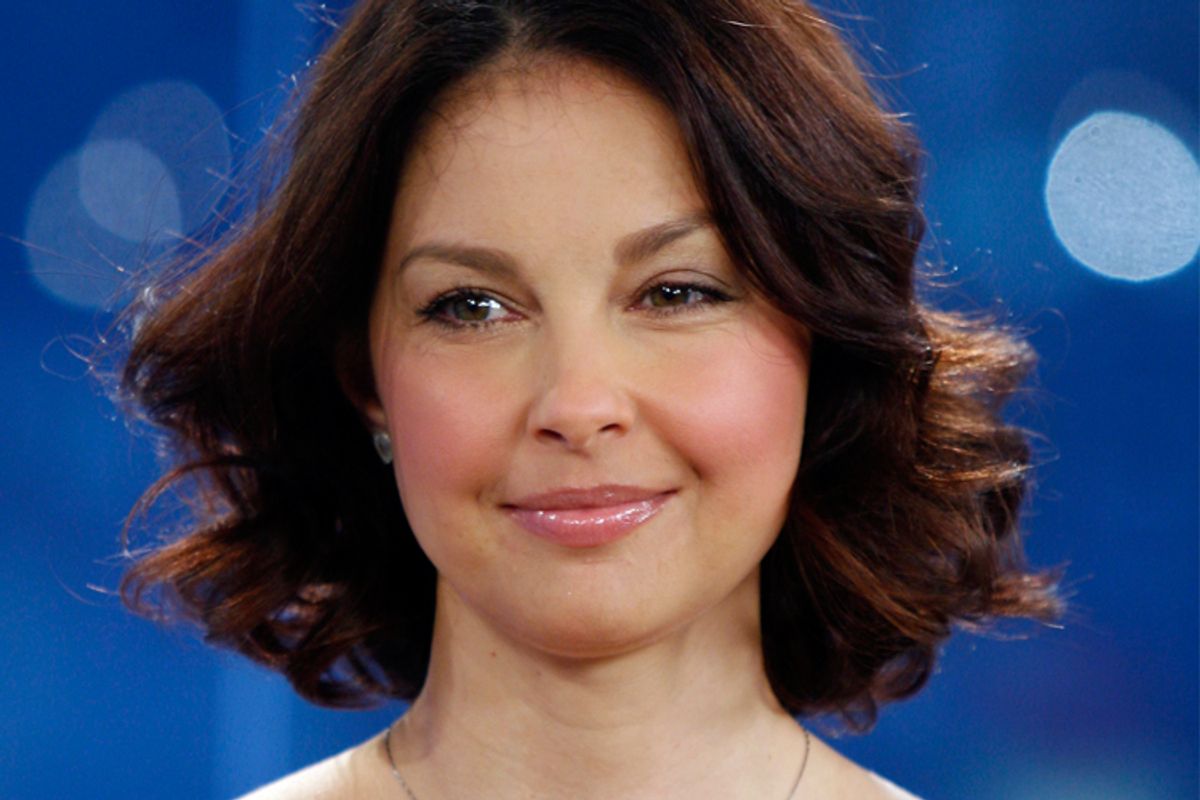"Rape and drug ordeal revealed in shocking memoir," blared the headline in Radar. "Ashley Judd Book Shockers!" trumpeted E!. And when Meredith Viera introduced Ashley Judd on the "Today" show Tuesday morning, she declared that "Growing up in the musical Judd family had all the makings of a tragic country song."
In her new memoir, "All That Is Bitter and Sweet," actress Ashley Judd, the sister of Wynona and daughter of Naomi Judd, lays out the story of a career in humanitarianism that was forged by a childhood in which she says she was exposed to drugs, weapons and repeated sexual abuse. Judd reveals, for example, that "there was always marijuana inside the house" and that when she was a toddler, her mother moved in with a man who was an "abusive full-blown heroin addict with a criminal record." And she details, frighteningly, an incident when she was a child: "An old man everyone knew beckoned me into a dark, empty corner of the business and offered me a quarter for the pinball machine at the pizza place if I'd sit on his lap. He opened his arms, I climbed up, and I was shocked when he suddenly cinched his arms around me, squeezing me and smothering my mouth with him jabbing his tongue deep into my mouth."
On "Today," Judd explained how a 2006 stint in rehab and an ongoing fellowship of recovery have helped her realize that "There is hope and help for friends and family of alcoholics." And she admitted to Meredith Viera that it took her a long time to recognize the childhood incest and sexual abuse she endured as abuse. "That's what sexual predators do. They groom their victims, and psychologically manipulate," she explained.
Judd is far from the only woman to come later to the revelation that a long ago event was in fact abuse. She writes in her book of an incident when she was 15: "There was a creepy Frenchman who hung out at the bar ... He offered me a ride home ... I was so young and confused that I had no idea that what followed was rape."
That Judd, who says she has suffered depression, insomnia and suicidal thoughts, could find a way not only out of the abyss but a way to use her history to advocate for others, is undeniably admirable. But perhaps the biggest bombshell -- in a story that describes her mother pulling a gun during a lover's argument, and the fact that "Mom and pop were wildly sexually inappropriate in front of my sister and me ... a horrific reality for me was that when pop was around I would have to listen to a lot of loud sex in a house with thin walls" -- is Judd's frank admission that the events of her past are shrouded in the fuzzy mists of memory. "The book is very honest, it's not necessarily accurate," she said on "Today," "because everyone in a family has their own perspective and their own experience. But it's very true for me." And her mother, Naomi, said at a press conference this week that "As a mom, I want to honor her reality. I want to know my daughter. Everybody's going to have a different reality."
The tricky truth is that life is not always clear-cut. What may well have been just another rollicking Saturday night for the elder Judds may have been torment for its youngest family member. Likewise, you might look back on a teenage experience as coercion, while another might call it abuse -- and you might well both be correct. Time and memory and the other experiences that build up along the way can change perception. They alter the story -- for all of the participants in it.
Judd has spent the last five years working on her past and her relationship to it. Unquestionably, no adult should try to put his tongue in a little girl's mouth. No child should be exposed to drugs and weapons. But Judd's admission that her memoir is "true for me" allows for an acknowledgment of the real trauma she's experienced while also making room in the narrative for other versions of events. Memory might not hold up in a court of law, but that doesn't matter much to a scarred heart, one that's suffering depression and a host of other hurts. And by admitting that, Judd is telling others that if it feels like abuse to you, it was abuse. And that's good enough.
Visit msnbc.com for breaking news, world news, and news about the economy



Shares